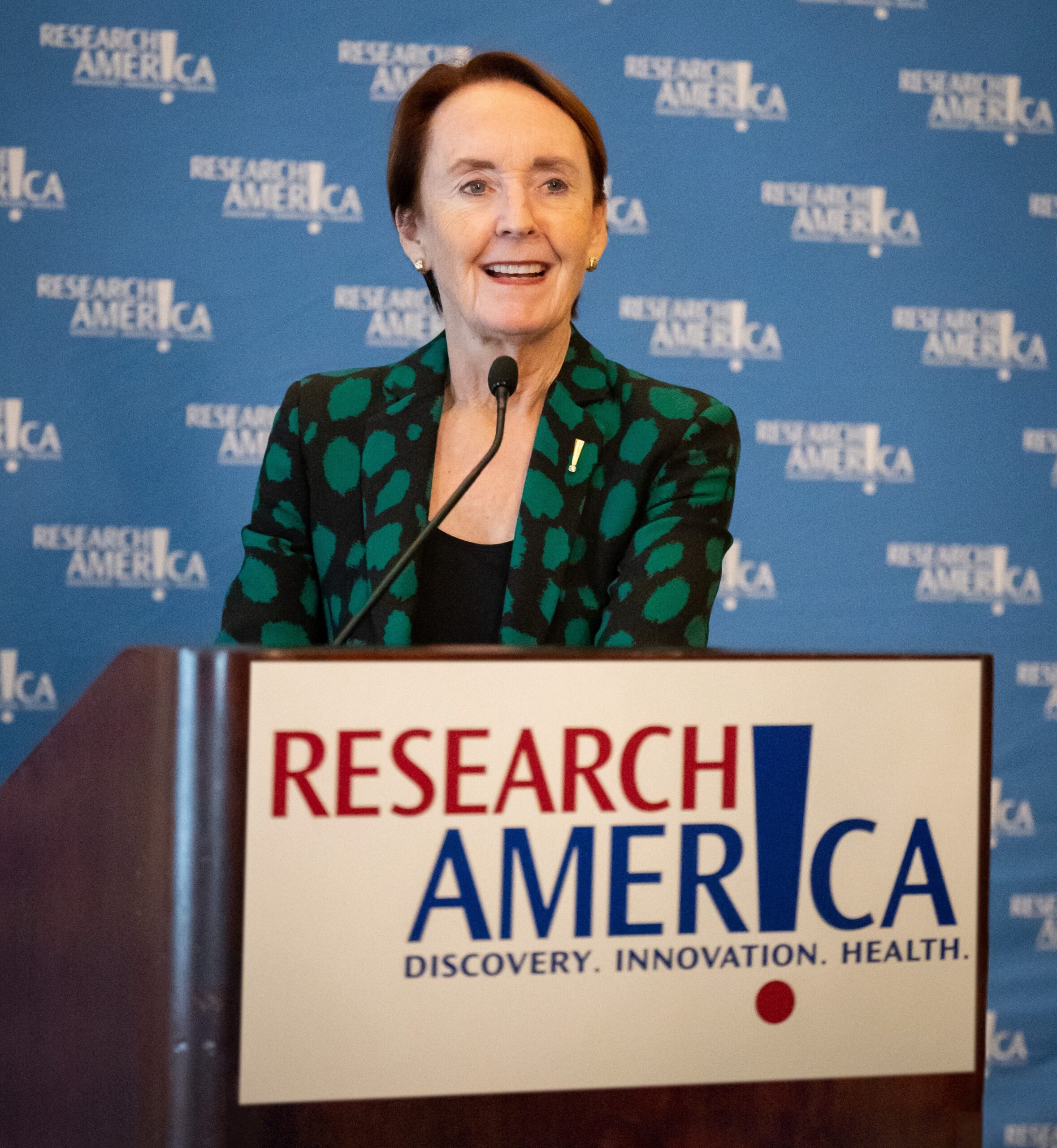Consequential Advocacy

Earlier today, we hosted our 37th Annual Meeting of Members, during which we put a spotlight on the importance of consequential advocacy.
Research!America’s distinguished Board of Directors joined our members in welcoming NIH Director Jay Bhattacharya, MD, who delivered the keynote address. He spoke of his admiration for the NIH, “the crown jewel of American biomedical sciences.”
Dr. Bhattacharya outlined his priorities, which include solving the chronic disease crisis, addressing the lack of research replicability, valuing innovation over incrementalism in research, re-establishing a culture of free speech and dialogue in science, and regaining public trust.
Research champion Rep. Diana DeGette (D-CO), Ranking Member of the House Energy and Commerce Health Subcommittee, and Dr. Julie Gerberding, CEO, Foundation for the National Institutes of Health and Research!America board member, spoke together about the challenges facing Congress. They underscored the importance of bipartisan support and urged advocates to speak out! Sharon Terry, president and CEO of the Genetic Alliance and an innovator in research advocacy, reminded us why we advocate on behalf of medical innovation: patients.
Research!America alliance members elected Kirsten Bibbins-Domingo, PhD, MD; Garth Graham, MD, MPH; and Sarah L. Szanton, PhD, RN, FAAN as our newest Board members. Our 2024 Annual Report was released, highlighting progress made last year and serving as a platform for working in an increasingly consequential way to assure the future of medical, health, and, indeed, all scientific research.
NSF Director Resigns: Saying he did all he could to advance the mission of the National Science Foundation (NSF), NSF Director Sethuraman Panchanathan announced his decision to step down, effective immediately. “This is a pivotal moment for our nation in terms of global competitiveness,” he said in his statement. “NSF is an extremely important investment to make U.S. scientific dominance a reality. We must not lose our competitive edge.” We couldn’t agree more, and we hope Congress and the administration heeds the call to invest in NSF and all other research agencies. A big salute to “Panch,” a true force for science and a consequential advocate!
On The Hill: Congress continues to work on Fiscal Year 2026 appropriations, taking into account a “skinny” version of the president’s proposed budget, expected to be released as early as next week.
The Senate Appropriations Committee will hold the first in a two-part, bipartisan hearing titled, “Biomedical Research: Keeping America’s Edge in Innovation,” led by Chair Susan Collins (R-ME) and Vice Chair Patty Murray (D-WA). The first hearing, scheduled for Wednesday, April 30, at 10:30 a.m. ET, will feature testimony from researchers and other stakeholders. Notably, Research!America Board Chair Sudip Parikh, will be a bipartisan witness, which speaks volumes to the respect he enjoys on both sides of the aisle. Watch the April 30 hearing here.
Organizations or individuals wishing to submit a statement for the hearing record must send it to a member of the committee and request it be submitted. Submissions must be in a single PDF of no more than 10 pages (including attachments). You can read the statement we submitted here.
Reject Proposed Cuts to HHS: Speaking of the (likely) content of the “skinny budget” proposal from the president… Last week, a leaked draft “passback” budget from the Office of Management and Budget (OMB) circulated, outlining a potential one-third funding cut for the Department of Health and Human Services (HHS) in FY26. In response, the Coalition for Health Funding (CHF) and other groups drafted this letter to House and Senate appropriators calling on them to reject the proposed cuts to HHS. If you or your organization would like to sign the CHF letter, please fill out this form by 11 a.m. ET tomorrow, April 25. Time is of the essence.
Research!America is tracking all major administration actions that could impact medical and public health research. View our executive action timeline here. As each new barrier arises, it prevents researchers from doing their jobs for the American people, which means less hope, less health, and less time for patients, even as it delivers more leverage for competitors like China. Now is the time for consequential advocacy to protect American medical and health progress!
A Powerful Speech: White House Office of Science and Technology Policy (OSTP) Director Michael Kratsios recently declared the dawn of a new “Golden Age” of American innovation, emphasizing the urgent need to bolster our nation’s scientific and technological leadership in the face of stiff global competition. Many of the goals outlined in his speech reflect the president’s letter to Director Kratsios and are consistent with the VAST playbook of recommendations to enable our nation’s long-term economic prosperity, security, and well-being.
Power of the Placebo: The placebo effect remains a fascinating and widely discussed phenomenon, both inside and outside of medical contexts. Join us on Tuesday, April 29, at noon ET for an engaging discussion on the placebo effect with Dr. Kathryn Hall, Senior Vice President for Research at the New York Academy of Medicine (NYAM). Register here. This convening is not limited to members-only, so do join us if it’s of interest, and pass along the invitation to others.
Join Us: Help amplify the impact of our multi-sector alliance on and off Capitol Hill. If your organization is not yet a member of Research!America, the process is straightforward and the benefits are ongoing. Email Senior Director of Membership and Development Kristen Furlong for more information. Please support us in achieving even more consequential advocacy.




